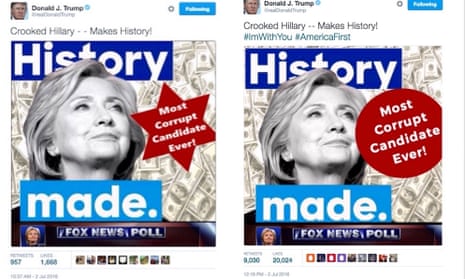To the long list of things that Donald Trump’s election has upended, we should add one more: the way Jews see the world.
For most of the last century, Jews have regarded America as a safe haven. While Europe had inflicted on its Jewish population a history of expulsion, persecution and eventually industrialised slaughter, the United States had given them a place where they could survive, and thrive.
The words on the base of the Statue of Liberty welcomed refugees like them: “Give me your huddled masses, yearning to breathe free” – words, incidentally, written by Emma Lazarus, herself a Jew. Not for nothing, did Jews refer to the US as the goldene medina, a golden land, a place of comfort after centuries of suffering.
In recent years, that sense had only sharpened. Reports of rising antisemitism, as well as a surge in xenophobic nationalism, in Europe confirmed for many Americans their sense that the old world was still haunted by its old, Jew-hating demons. For many US Jews, Europe seemed permanently stuck in 1938, on the brink of an antisemitic catastrophe. In this conception, the US remained comfortably immune from the virus of Jew-hatred.
That certainty has vanished in the last week – and the appointment of Steve Bannon as the most senior adviser to the incoming president has deepened the anxiety. For Bannon is the boss of the far-right Breitbart website, which as well as attacking women, Muslims and African-Americans has targeted Jews. A recent column denounced the journalist Anne Applebaum: “Hell hath no fury like a Polish, Jewish, American elitist scorned.” Another slammed the Republican editor of the Weekly Standard as a “renegade Jew”. Of course, one should always be wary of the accusations divorcing spouses make against each other, but Bannon’s ex-wife testified that he once objected to her choice of school for their daughters because “he didn’t want the girls going to school with Jews”. (Bannon denies this happened, pointing to the fact that his wife prevailed in her choice of school.)
If it were just Bannon’s back-catalogue that was at issue, perhaps the concern could be contained. But the problem is that Trump’s campaign trafficked in the full range of antisemitic motifs and tropes. It’s not just that Trump himself retweeted neo-Nazis, or that his campaign put out an image of Hillary that had been lifted from an antisemitic site – depicting Hillary Clinton against a giant backdrop of cash and a six-pointed star uncannily like a Star of David. It’s that last month Trump warned that Clinton “meets in secret with international banks to plot the destruction of US sovereignty” – a line that could have been lifted straight from the Protocols of the Elders of Zion, the notorious Tsarist-era forgery that purported to be evidence of a global Jewish conspiracy.
Trump pushed the same age-old canard in his closing TV ad. It featured a gallery of three villains, all of whom were Jews: philanthropist George Soros, the Federal Reserve chair, Janet Yellen, and the Goldman Sachs boss, Lloyd Blankfein. The narrator’s words used as each of those faces appeared came from the lexicon of classic antisemitism. Soros: “those who control the levers of power”. Yellen: “global special interests”. Blankfein: “global power structure”. Trump supporters have taken their cue and bombarded Jewish journalists with the vilest form of abuse.
None of this has ended with the campaign. The conspiracy theorist and propagandist Alex Jones says Trump has phoned him since his election, promising to appear on his radio show “in the next few weeks”. Last month Jones ranted against “the Jewish mafia in the United States”.
It’s worth stressing two things. This is not antisemitism of the subtle variety. Nor is this antisemitism of the kind that we have got used to debating in Britain in recent years: an obsessive hostility to Israel that draws on the language or imagery of anti-Jewish racism. This is old-school, hardcore, Jews-are-taking-over-the-world antisemitism. And it is being voiced not by European leftists or Muslims – who, until last week, many American Jews held to be the chief source of modern antisemitism – but by America’s next president and his allies.
Of course some have tried to reassure themselves that there’s nothing to worry about. They point to the fact that Trump is close to his Jewish son-in-law, Jared Kushner, and that indeed Ivanka Trump has converted to Judaism. This is to ignore the fact that antisemites have often exempted those they deem to be “good Jews”, exceptions to an otherwise robust rule. They forget that antisemites frequently boast that “Some of my best friends are Jewish”, that those denouncing Jews will often place a friendly hand on the arm of the Jew in the room and say, “I don’t mean you, of course.”
Others have sought comfort in the fact that Trump has made some positive noises towards Israel, and that Binyamin Netanyahu has given him a friendly welcome. But this is to forget what European Jews learned long ago: that nasty rightwing nationalists can be pro-Israel – for reasons utterly alien to Jews’ own feelings about the country. So ultra-nationalists might admire Israel either because they see it as standing up to those they deem the Muslim enemy or because they like the idea of a country far away that might take the Jews off their hands. Neither of these sentiments makes them pro-Jewish.
This distinction has set European Jewish communities at odds with Israeli governments repeatedly over the years. It’s happening again now in Austria, as the local Jewish community fears the far-right presidential candidate Norbert Hofer even as Israeli officials have engaged with him.
Small European communities have been saying for years now that pro-Israel is not the same as pro-Jewish. But they were too small to be listened to. Now that same argument is playing out on a much bigger stage, as America’s Anti-Defamation League bravely denounces the president-elect, while others say Trump should be given a chance.
Either way, this is unfamiliar and unwelcome territory for American Jews. They are discovering that antisemitism is not a thing of the past, nor confined to distant Europe. It is alive and active in their own, golden land – and now it is endorsed from the very top.

